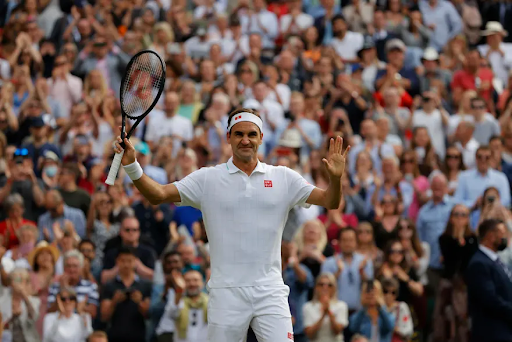
After more than 20 years on the professional tennis tour, Roger Federer has announced his retirement from the sport. Retirement has been in the air for tennis this year. Serena Williams — who, like Federer, is a generational talent who amazed with dominance and longevity alike — had her swan song just two weeks ago at the U.S. Open. Unlike Williams, though, Federer’s final match will not be under ideal circumstances. Plagued with a persistent knee injury, Federer is forced to choose the Laver Cup (an exhibition-style tournament with far lower stakes than a major event) as his last event. He will not be able to play singles, the format in which he racked up a previously record-high 20 major titles on the ATP. His final match will likely be a melancholic feel-good doubles match with longtime rival Rafael Nadal as his partner.
Federer was a fiercely dominant figure in the early to late 2000s. Wimbledon was (and is) widely regarded as the most prestigious tournament out there, and Federer won it five times in a row from 2003 to 2007. Towards the end of his run, Nadal, who had been the #2 to Federer’s #1 for several years, started to breathe down Federer’s neck. When those two players met in the 2008 final, Federer bidding for his sixth straight Wimbledon title, sparks flew. Nadal jumped out to a massive lead, winning the first two sets and seizing control of the third, but Federer launched a sustained comeback, stealing the next two sets in close tiebreaks. Though Federer eventually lost in a heartbreakingly tight fifth set as night fell, it was a perfect end to his streak at Wimbledon. He had ruled the place for years and years, then gave up the keys to his biggest rival only after the most savage of battles.
Federer’s retirement is the polar opposite of his early arc at Wimbledon. Ideally, after such a glittering career — he once spent 237 consecutive weeks occupying the number one spot in the rankings — his time on tour would come to an end with an epic match, or a final tournament victory. But Federer is 41, and tennis rarely shows any tenderness to even its best players. Federer avoided bad injuries for the vast majority of his career; some say his most impressive stat is playing over 1500 professional matches and not retiring through injury in the middle of a single one.
Federer is not retiring because he wants to, his body simply will not allow him to play any longer — a cruelly ironic fate.
While Federer’s last match will not represent the career that preceded it, he will leave an immense legacy. He was the first of the Big Three — the triumvirate of tennis titans including him, Nadal and Novak Djokovic — and therefore the player to set the bar for those to follow. Nadal and Djokovic, in tailoring their games to beat Federer specifically, reached some startling heights along with their elder rival. Those three played each other again and again, each time producing matches or individual points that simply could not have existed in previous years. Federer played Nadal 40 times, Djokovic 50 times. (Djokovic and Nadal, who are still in their mid-thirties and shared three of the four major titles this year, have clashed 59 times and may yet go past 60.) As the first, Federer must get significant credit for ushering in this golden era.
Federer said in an interview with
NPR
’s Savannah Guthrie that he would not be a stranger to tennis post-retirement, mentioning that Björn Borg had taken 25 years to visit Wimbledon after the end of his career. Guthrie, like so many others, admitted to having a Federer obsession in the past. Federer commands immense respect among his fellow tennis players; they have voted him to the Stefan Edberg Sportsmanship award a staggering 13 times in the last 20 years. Federer has been voted fan favorite by the masses 19 times. Even the Laver Cup event, where he is to play his last match, is his brainchild. Federer mused in a recent interview that he might like commentating one day. He is not going anywhere.
















